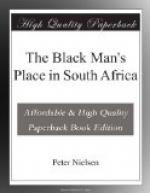“The people you have heard to-day came to me and told me that they had had sickness and death at their kraal. I knew these people and I knew that there had been strife among them for a long time over the dividing of an inheritance. I threw the bones[18]—it is our way—and I told these people that the spirit of the old woman, who was the grand-mother of most of them, was angry because of the quarrelling that did not cease; I told them that the snakes, that is to say the ancestral spirits of these people, were angry at the noise of the quarrelling, and I told them to redeem their fault by killing a goat,—it is our way. And now it is said that I have done wrong. In what way have I done wrong? I have heard a white missionary say that the white man’s God sends sickness to people when they sin, and that if the sinners leave off their evil ways then they become well and happy again, and I said the same to these people—and if they paid me ten shillings, why, do not the whites make payments to their priests?”
I might add, in parenthesis, that the argument advanced did not find favour with the magistrate on the bench who, like so many of his kind, had little knowledge of Bantu lore and languages, and who therefore could only perceive the letter of the law and not the human spirit behind the acts that constituted a breach of the white man’s statute.
The Natives, like most of the white people, prefer not to think overmuch about death and whether there be life for us beyond the grave; like the vast majority of Europeans they prefer to take the superstitions and beliefs of their forefathers for granted. Vague notions about ancestral and familiar spirits that emanate from the grave in the guise of snakes or other animals are accepted in the same spirit or traditional mood in which the doctrines and dogmas of the various religions of Europe are accepted by the bulk of white believers.
I have found among the Bantu the same child-like faith in all that is proclaimed by traditional authority about things supernatural, and I have found also among them the same hesitation or inability to believe without questioning in all that is laid down in the name of tradition that we see among ourselves. The will to believe is temperamental and general, but the unbeliever is found among the Bantu as well as everywhere else.
I remember that I asked a raw Native once what he thought about the after-life in which so many white and black people professed to believe. He answered: “The white people are a clever race; they see many things in their books; perhaps they can see even beyond death. I do not say that they are liars, as some of our people sometimes say. They may know these things, I do not. All I know is that when I die this breath that is now in me so that I am able to think and speak will leave my body which then must be put away in the ground: I think that will be the end of me—but, not quite, for there,”—here he pointed to his infant son who was toddling about in the strong sunlight—“there in him, my son,” and his voice grew tender as he spoke, “I shall live on because he is part of me, my life is in him; I cannot die altogether so long as he lives, but if he should die and not leave a son to carry on my life, then should I die the death utterly.”




